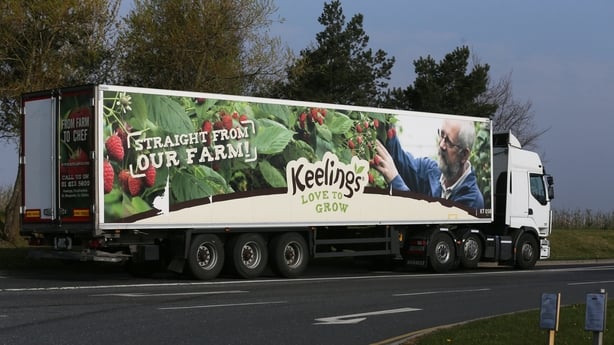Fruit distribution company Keelings has again defended its compliance with HSE guidelines on the Covid-19 virus but confirmed that workers flown in from Bulgaria are sharing bedrooms.
In a statement to RTÉ News this evening, Keelings stated the workers are currently observing restricted movement protocols and are housed in three- or four-bedroom apartments which contain a living space and bathroom facilities.
It said: "No more than two persons occupy a bedroom, and therefore apartments are occupied by between six and eight persons each."
This follows the controversy over 189 Bulgarian workers flown to Ireland by Keelings last week on a charter flight to pick this year's crop. 390 had previously arrived on scheduled flights.
Keelings has said that it is impossible to recruit Irish people to do the required work, and that when it advertised recently it only got 40 applicants.
Today, RTÉ has seen internal Keelings documentation sent to staff on dealing with the virus.
It states that workers are being divided into "Family Units", in which "you will be rostered to jobs together, travel together, use the canteen together and share accommodation facilities".
The memo goes on: "Social distancing guidelines should be followed at all times where reasonably practicable, however in buses and canteens, the 2m social distancing guidelines must apply between different family groups or individuals".
It also states: "'Family units' must not congregate in groups larger than 49 people under any circumstances, at work or at home."
It also states: "All operatives whether in "Family Units" or not, should practice 2m social distancing when getting on or off the bus at work and accommodation units. If in public spaces, 2m social distancing must be practiced at all times, including when waiting for the bus or when queuing for shopping."
In a statement to RTÉ this evening, Keelings stated that it uses the term 'Family Unit' to refer to "...groups of persons resident together in an accommodation unit".

Keelings also said that both permanent and seasonal employees are subject to the same public health restrictions as apply to Irish residents, and are provided with training to ensure they understand the rules.
It stated: "Accordingly, our employees are advised not to congregate in large groups. To assist in their observation of restricted movement protocols, we have arranged for any required foods or essential items to be delivered to their place of residence."
Keelings also pledged to provide medical assistance or individual accommodation for isolation to any employee who may require it, and reiterated that all 189 Bulgarian employees were health screened before travelling to Ireland.
The company said the workers will be subject to further medical screening before they start work at Keelings.
It will continue to consult with the HSE and other appropriate agencies to ensure both staff and the communities they live in remain safe.
Keelings noted that its employees, like those of other employers, are entitled to the State's Enhanced Illness Benefit Scheme if they become unable to attend work due to illness or a requirement to self-isolate - and the company provides assistance to employees who may need to apply.
In addition, given the necessity to ensure employees are facilitated in taking time off work due to illness, "...Keelings will financially support employees who may not be eligible for this statutory scheme".
Paul Murphy TD criticised Keelings accommodation arrangements for workers from abroad in light of the current Covid-19 emergency.
He said the State "must urgently investigate these working conditions".
He added: "I have written to both the Health and Safety Authority and the Environmental Health Unit of the HSE seeking they investigate.
"Unite the Union, who have previously assisted groups of Keelings workers' must also be given access to these workers in order to be able to represent them."
The ability for migrant seasonal agriculture workers to continue harvesting fruit and vegetables in other member states was specifically requested by EU leaders, including Taoiseach Leo Varadkar, during a video conference on 26 March.







